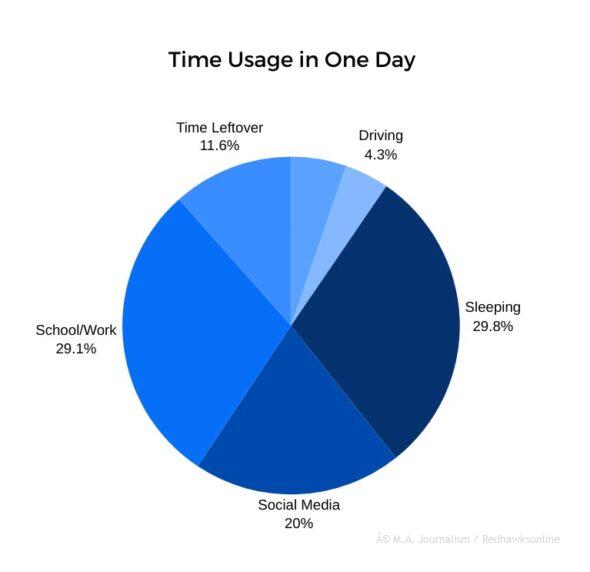How much is too much? Does it even matter?
Tick tock, the clock strikes one through twelve, but on TikTok, the clock doesn’t stop. Wake up, turn off your alarm, check the time, and swipe throughyour notifications. Get up, go to school or work, and look at some sort of screen. There are tasks and important things to do but you check your phone again and go off on a tangent. You aimlessly scroll and temporarily get stuck in the electronic abyss. With an algorithm that spans longer than a human life, it can be hard to look up from your phone or computer. As reported by Alex Kerai at Reviews.org in July 2023, Americans check their phones 144 times a day, so how could one not get comfortable within the internet’s grasp?

When someone looks at the big picture to see how much time they really spend doing various things, devoting a large portion of one’s life to “screen time” seems less worthwhile than it might feel like at the moment of screen browsing.
The average American spends 7 hours and 4 minutes per day on a screen. To put that into perspective, that is 424 minutes daily, 49.46 hours weekly, 2571.9 hours, and just over 107 days yearly, according to Cross River Therapy. This means that an American spends nearly one-third of their year looking at a screen. The worldwide average is 6 hours and 58 minutes, with Americans spending only seven minutes more. In addition to this, according to a widespread survey done by Gallup News, teens spend 4.8 hours a day on social media. This means that aside from school work or anything else online, a teen averages 288 minutes a day, 33.6 hours a week, and 1752 hours and 73 days a year just using social media. Moreover, Sleep Cycle says the average American gets just over 7 hours of sleep per day. This rounds out to about 109 days spent sleeping per year. So, when not on either a screen or sleeping, there are only 149 days left yearly. But what are the leftover days used for? Well, what most people would consider to be living.
In an age where screens are omnipresent, and there is a never-ending stream of content, what can be done to remain conscious? Dave Eisenmann, director of technology at Minnehaha Academy is passionate about the difference between recreational and educational screen time.
“[Educational screen time] is something that you’re learning from [and] recreational screen time is basically just the opposite,” said Eisenmann.
At Minnehaha, students are provided iPads to do the majority of their schoolwork. The iPads are a great tool because all of their class work is centrally located and provides an accessible way to locate and take advantage of helpful resources.
“Educational screen time is how most people learn things,” said Eisenmann. “A lot of the reading that you do can be done online or in electronic books, articles, and news sources [and] you can do all sorts of research and have access to all sorts of information from around the world, no longer just within your school library and no longer just within your one textbook for a class”.
Being online has positive benefits like connectivity, school resources, and a centralized workplace, but at the moment, the use of screens is astronomical.
“screen time has increased by almost 50 minutes per day since 2013” according to Steven Zauderer at Cross River Therapy.
This is a substantial increase, and most of the additional minutes are taken up non-occupationally/recreationally, meaning that an additional hour of social media and streaming has been added to many people’s days within the last ten years.
The advantages of screens and technology are abundant, but the use of screens for additional recreational purposes has gotten out of hand. Aforementioned, 73 days of a teen’s year are spent on social media. Days spent on TikTok, Snapchat, Instagram, etc.
“You might hop on Snapchat and send a picture of the floor to your hundreds of online friends,” said Eisenmann.
This is time that adds up quickly and could be spent learning new things or getting out into the real world, but instead, people are choosing to spend their lives online.
You’ve heard it before, “get off your phone”, “It’s a waste of time” and you’ve probably chosen to ignore it but millions of hours of human lives are being lived online.
“You know, it’s just for fun,” said Eisenmann. “Sometimes it’s, you know, watching a movie or playing a video game or something like that…You’re maybe just relaxing or killing time”.
There is nothing wrong with using screens recreationally, rather the duration of time they are being used causes problems. Are you okay with a third of your life being lived on a screen?
Humans live off of borrowed time, and anthropological clocks will eventually time out. Between the dooming trap of social media and streaming apps as well as the job market blurring the lines of the physical and digital world, screens have become extremely commonplace. This typicalness causes people to only be promised one-third of each year to live, which will eventually add up to one-third of a life.
It is easier said than done to eliminate excess phone and other screen time. However, by setting time limits for social media and streaming apps, as well as being self-aware and accountable for how much time is being spent online, people can begin to detach themselves from their screens. After all, like Annie Dillard says in her famous book The Writing Life, “How we spend our days is, of course, how we spend our lives.” So, with people spending their lives online, have they truly been living?

